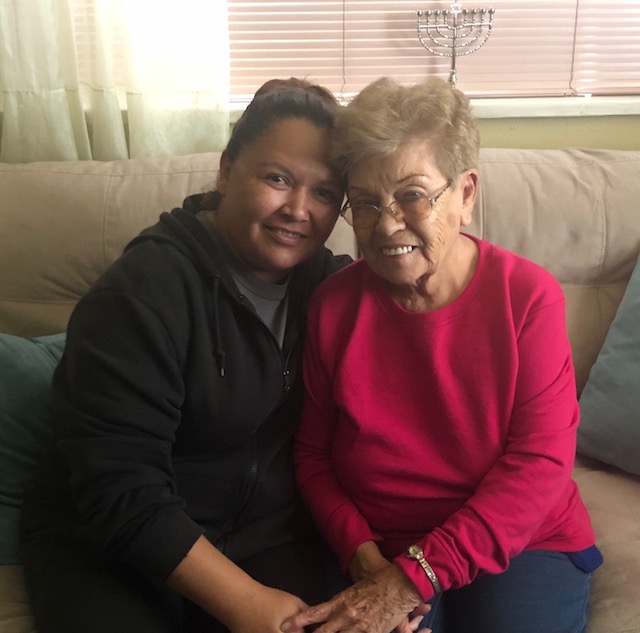Vision loss is difficult for seniors. As the years go by, they may start to lose the ability to do the things they’ve always done, simply because they can’t see well enough to do those activities. The most common causes of poor eyesight in elderly adults are macular degeneration, diabetic retinopathy, cataract and glaucoma; however, no matter the reason, the result can be the same: feelings of frustration and depression due to decreased independence. Fortunately, there are ways for you and your elderly loved one’s caregiver to ease this challenge. Use these five techniques to help your loved one navigate the world with greater ease and comfort despite a loss of vision. Face Them While You’re Speaking Facing a senior with vision loss helps them hear you more clearly and identify where you are in the room. Listen attentively and offer verbal cues to indicate your involvement in the conversation. You’ll also want to be clear about ending a conversation or leaving the room, so the person doesn’t keep talking while you’re not there to listen. Let Them Set the Pace While walking with a vision-impaired senior, match their pace to avoid accidentally pushing or pulling. It can be difficult for the elderly to maintain balance, anyway; with poor eyesight this becomes even more challenging. If you accidentally encourage them to move a step too fast or too slow, it can disrupt their balance and cause a fall; it may also cause anxiety if they are placing their feet before they feel comfortable and ready for each step. Explain Loud Noises We may hear a strange noise and see a dog across the street; we know the dog was barking or howling. However, sometimes a bark doesn’t sound like a bark at all, especially if you don’t have the visual cue to know where the sound came from. Screeching tires, backfiring cars, animal noises, and falling objects can be difficult to identify without seeing where the sounds originated. Without that visual context, the sounds can be alarming or even frightening. Therefore, it’s helpful if you simply explain the noises: “Wow, that’s a big dog! He looks like a bear” or “Those construction workers just knocked down an entire wall!” gives context to the sudden noise. Describe What’s Happening Every moment is full of little pleasures, and your elderly loved one may miss a lot of them if they can’t see them. Take some time to talk about what you’re seeing in front of you. If you’re at an event, like a graduation, this might mean a little play-by-play of what’s happening on stage and how your graduate looks in his gown. If you’re walking down the street, you might like to point out a unique car, an especially beautiful house or landscaped yard, or the kids who are skateboarding in the park. Let Them Hold Your Arm Even a small degree of vision loss can dampen his confidence about getting around safely. While walking with your loved one, hold their arm or allow them to hold yours so you can help guide them. Not only will this improve their confidence (they know you won’t run into anything!), it also helps them feel more stable and balanced. If you need help caring for an elderly loved one with poor eyesight, we’re here for you. Elderlink Home Care, Inc. has served the Denver area for 30 years with a commitment to high-quality home care. Our compassionate staff is dedicated to creating a high quality of life for your senior in the comfort of his or her home. For more information about Elderlink Home Care, Inc.’s services, contact us. We’ll work with you to develop the right care plan for your loved one.
Make an Appoinment
People cannot always tell the difference between delirium and dementia. Although both conditions can cause cognitive confusion and lead to emotional distress for a senior, there are some differences family members and caregivers should be aware of so the senior can receive appropriate care and treatment. What Is Delirium? Delirium is an abrupt change in the brain that causes confusion. This condition may come and go and is generally temporary and reversible. This is one of the key differences between delirium and dementia: “Delirium is also unique for its severe disorganized thought. This usually leads to a period of inattention or distraction, making the individual unable to focus on tasks. Dementia also features a poor level of focus and concentration, however, the difference is that delirium’s lack of focus stems from rapidly processed thoughts,rather than the stifled ability to conduct thought.” Delirium occurs when the brain doesn’t get enough oxygen or other nutrients, which can be caused by a variety of factors. The biggest one is chronic disease; in fact, dementia itself can cause delirium. Other causes of delirium may include: Alcohol or Drug Abuse and Withdrawal Bacterial Infections, like Urinary Tract Infections or Pneumonia Certain Prescription Medications Surgery and Procedures Requiring Anesthesia Severe Emotional Distress High Fever Sleep Deprivation Dehydration What Is Dementia? Dementia is cognitive impairment that worsens over time, caused by damage to the brain. As the Alzheimer’s Association points out, “Dementia is not a specific disease. It’s an overall term that describes a group of symptoms associated with a decline in memory or other thinking skills severe enough to reduce a person’s ability to perform everyday activities.” The most common type of dementia is Alzheimer’s; the second most common type develops after a stroke, which is known as vascular dementia. Dementia can also be caused by a head injury or trauma, a brain tumor or even a vitamin deficiency, although such a deficiency represents a type of dementia that can often be improved when the cause is recognized and treated. Recognizing the Difference Between Delirium and Dementia Delirium and dementia have many similar symptoms: Difficulty focusing and solving problems Irritability Aggressiveness Memory loss and trouble forming new memories However, it’s essential to recognize the difference. Certain medications that may be used for dementia could actually make delirium worse; in other cases, failing to recognize delirium might mean the senior doesn’t get the care that would help ease or reverse the condition. Here are three key points to help you identify the difference between delirium and dementia: Delirium comes with an inability to focus on a task; a patient with dementia is confused because of an inability to process thoughts. The Alzheimer’s Association says the hallmark of delirium is inattention. Delirium is generally intense and short-lived; dementia is a gradual decline and you will tend to notice symptoms worsening over time. Delirium can generally be reversed if the cause is recognized and corrected; dementia generally cannot. How Elderlink Home Care, Inc. Can Help You If you have a loved one suffering from dementia or Alzheimer’s, Elderlink may be able to help! Elderlink Home Care, Inc. has served the Denver community for 30 years with a stellar reputation and thousands of satisfied clients. We take great pride in our knowledgeable, compassionate staff and our commitment to high-quality care. For more information about Elderlink Home Care’s services, contact us today. We’ll work with you to identify the best strategy to get your loved one the care he or she needs.
Do you have any family members or clients who suffer from dementia? Are you a caregiver looking for positive movies for your client to watch? Surveys completed by caregivers show that clients with dementia are often in more positive moods and more communicative after watching a positive movie. If you’re searching for an uplifting movie to watch with your parent or client, here are 5 of the best movies for dementia patients: It’s a Wonderful Life Director: Frank Capra Date of the first release: January 7, 1947 Main characters: George Bailey, Mary Hatch, Mr. Potter, Uncle Billy, Clarence, and Mrs. Bailey Summary: In this timeless classic, a gentle and kind angel, Clarence, is sent to earth to show discouraged businessman, George Bailey, what life would have been like had George never been born. While this film is associated with the Christmas season, it is a joy to watch any time of year. Cheaper by the Dozen Director: Walter Lang Date of the first release: April 1950 Main characters: Frank Bunker Gilbreth, Ann Gilbreth, Mrs. Lillian Gilbreth, Deborah Lancaster, Ernestine Gilbreth Summary: This movie is based on the real-life story of the Gilbreth family. The movie highlights the amusing challenges of large families. Frank Bunker Gilbreth was considered a pioneer in the study of motion and used his family to test his theories, resulting in embarrassing and funny situations. Grumpy Old Men Director: Donald Petrie Date of the first release: December 25, 1993 Main characters: John Gustafson, Max Goldman, Ariel Truax, Grandpa Gustafson Summary: Two elderly men, John and Max, have been neighbors for over 50 years. Constantly arguing and trading insults, the two become infatuated and competitive over new neighbor Ariel. A warm and funny story about life-long relationships. Singin’ in the Rain Director: Stanley Donen, Gene Kelly Date of the first release: April 11, 1952 Main characters: Don Lockwood, Cosmo Brown, Kathy Seldon, Lina Lamont, Summary: Singin’ in the Rain is set in 1927 when silent films started transitioning to films with sound. The storyline is based on the challenges Don Lockwood and Lina Lamont face as Lina finds her voice isn’t suitable for talking movies. Enter Kathy Seldon who has a great voice but lacks the talent of Lina. Sing along with the familiar theme song while watching the amazing dancing of Gene Kelly. The Sound of Music Director: Robert Wise Date of the first release: March 29, 1965 Main characters: Maria, Captain Von Trapp, the Baroness, Max Detweiler, Mother Abbess, the Von Trapp children Summary: Maria leaves a convent to become a governess to widower Captain Von Trapp’s seven mischievous children. Although she faces hostility at first, Maria soon wins over both the children and Captain Von Trapp. Enjoy beautiful songs such as My Favorite Things, Do-Re-Mi, and Climb Ev’ry Mountain. The Importance of Happy Endings The best movies for people with dementia are movies with happy endings. Comedy, music and an engaging storyline contribute to creating a positive experience. The famous saying that “laughter is the best medicine” is true no matter your age. Planning a movie date at home with your parent or client is a great way for both of you to unwind and enjoy classic entertainment. It is important to have care you can trust when it comes to caring for your senior loved one. Elderlink Home Care, Inc. has served the Denver area for over 30 years and have helped thousands of satisfied clients. They take great pride in their knowledgeable, compassionate staff and their commitment to quality care. For more information about Elderlink Home Care, Inc’s services, contact us today.
Taking care of our aging loved ones or clients is very fulfilling. It is rewarding to give back to the generations that has cared for and paved the way for us. Realistically however, particularly if you are caring for a loved one, it can be easy to neglect yourself and your own needs. To continue providing your loved one or client with the support they need, it’s wise to assess your own well-being from time to time. To help you do that, here are 5 warning signs that you might be experiencing caregiver burnout. You feel exhausted even after a good night’s sleep. Of course, you might not feel like you can run a marathon each day. But you should feel like you have gotten adequate rest to physically and mentally carry out the day’s activities. Exhaustion might seem to be a ‘normal’ part of the life of a caregiver. But it definitely does not have to be. You get sick easily. An immune system functions well when the body gets sufficient rest, good nutrition and other forms of proper care. If you are catching colds or facing other types of illnesses frequently, it could be a sign that you are overextending yourself. It becomes hard to experience feelings of joy or excitement. Caring for a loved one is a gratifying experience. But over time, that joy and contentment can fade. And it’s not because that loved one is any less dear to the caregiver. It is the sad result of pushing past one’s reasonable limitations. This lack of joy can also extend to other areas of life. Meeting friends for dinner or outings are a thing of the past. Most full-time jobs limit the amount of leisure activity that can be enjoyed. However, if time for recreation has slowly dwindled into non-existence, you and your loved one won’t be able to benefit from ways taking time for yourself can revive and refresh you. Your food consumption is too little or too much. Stress often leads to eating too much. Also, being too busy can cause caregivers to skip meals. Either of these habits comes with their own consequences, and it’s often not simply a matter of being overweight or underweight. This is not meant to be an exhaustive list of all signs of caregiving burnout. But these are 5 of the most common indications. Because you are so diligent about giving your loving to your loved one or client, you may not even realize you are experiencing burnout until you face extreme emotional exhaustion or feeling as if you are coming to a breaking point. So take these and other warnings to heart. Understandably, it might cause you to feel a bit guilty for wanting to improve your own quality of life. But finding practical ways to do so will not only improve your days, it will in turn improve the quality of care your loved one receives. So it is important to recognize the warning signs before you jeopardize your health, well-being and caregiving abilities. Whether you believe you are already experiencing caregiving burnout, or you are heading in that direction, Elderlink Home Care Inc. can help. We have proudly served the Denver Metro area for 30 years. Since 1988, we have provided excellent in-home care to thousands of satisfied seniors in the Denver area. We have received many positive testimonials from current and past clients. For more information about in-home care and how Elderlink can possibly help, please contact us today.
Elderlink Home Care, Inc. is excited to announce the winner of our ‘Celebrating 30 Years’ grant: Mrs. Cecilia Dalton! Mrs. Dalton was nominated by her granddaughter, Davida Duran (pictured). Mrs. Dalton, 85, was born in Sopris, Colorado and has lived in Colorado her whole life! She spent the early years of her life raising her five children. Mrs. Dalton now has 20 grandchildren; including one grandson she has raised since he was baby and still lives with her. She worked at Denver Health for a number of years before retiring. The most important things in Mrs. Dalton’s life are time spent with her family and her church. Mrs. Dalton was very close to her sister, who recently passed away. When asked what her plans were for her $300, she said she would be putting it directly into her savings account! Congratulations Mrs. Dalton!
High cholesterol can be a serious health problem for many seniors. It significantly raises the risk of heart disease, stroke, heart attack and other serious health problems. Fortunately, there are several simple steps that can be taken to lower bad cholesterol levels, raise good ones and help seniors remain healthy! Make Simple Dietary Changes Let’s face it: Major diet changes are never easy. However, by encouraging your loved one or client to make a few simple changes, their cholesterol levels can be lowered–and often, they won’t notice what they’re missing. Try some of these strategies: Eat fatty fish like salmon, mackerel and tuna Try whole grain products instead of their processed alternatives Avoid trans fats Eat fewer processed foods Minimize refined carbohydrates Add in foods rich in antioxidants, like fruits and vegetables Incorporate Simple Activities When your client or loved one isn’t moving, it’s easier for bad cholesterol to build up, hardening their veins and making it difficult for them to get healthier. Regular activity, on the other hand, can decrease bad cholesterol! Try some of these simple activities: Take up dancing! Classes together can be a great bonding experience. Get out and take a walk several times a week. Go for a swim. During the summer months, swimming outside is a fun, free exercise. Even during the winter, many gyms offer indoor water aerobics programs. Start gardening. Growing pretty flowers or fruits and vegetables is both healthy and invigorating! Find a class at your local gym or senior center. There are plenty to choose from and they’re sure to find something appealing! Decrease Portion Size There are a number of foods that are very healthy and full of cholesterol-fighting properties. Unfortunately, many of them are also high in calories. Whether you’re changing your senior’s diet to incorporate more good fats or they’re indulging in a favorite treat, practicing portion control is the best way to ensure that the treatment will be healthy, rather than causing more health problems down the road. Encourage Socialization Regular social contact with others has a higher impact on the body’s overall health–including cholesterol levels–than giving up smoking. If your loved one is struggling with high cholesterol levels, consider looking for more ways to get them out and about, socializing with loved ones. This could include: More family time! Take vacations together, plan family events, or just get together and hang out. Getting involved with a local church or charity. Spending more time at the local senior center, engaging in activities they offer. Increased socialization won’t just help with cholesterol levels. It will also help your senior loved one live longer and enjoy a fuller, happier life–so make sure that socialization is an on-going priority. Laugh Often Laughter is known to give you a healthier heart. It raises the levels of good cholesterol in your blood, decreases stress, and even offers an immune system boost! Watch funny movies or read funny books with your client or loved one. When you’re not around, encourage them to engage in these pastimes on their own as well. Drop the Bad Habits As your loved one approaches their senior years, it’s time to think about what those bad habits are really worth–most notably, smoking and drinking. Both regular alcohol consumption and a smoking habit can have a negative impact on cholesterol levels, leaving your loved one struggling to get their health under control. Simply giving up those habits, on the other hand, can keep them around longer. Follow Doctors’ Recommendations If your loved one has been prescribed a medication for high cholesterol, it’s important that they take it exactly as prescribed! Their doctor is monitoring their cholesterol levels and will adjust the medication as needed. Many people believe that as their cholesterol drops, they no longer need the medication. Unfortunately, this can simply complicate the issue and lead to a greater need for medication later on. Dealing with high cholesterol in a loved one isn’t easy, especially with all the fears it brings up. If you need more help caring for your senior loved one, contact us today to learn how we can help.






